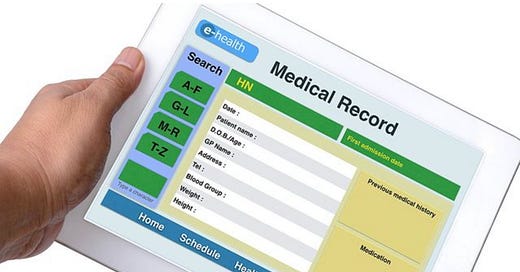30/11/22 - When the (healthcare) world will (but might not) change…
Patient access to GP records - what does this mean for you?
Things take quite a long time to change in the NHS. So much so there is an entire discipline in UK health economics called “NHS organisational change management”. I studied this module and the conclusion was - things take a long time to change in the NHS. Kind of went full circle there..
After years of planning, the NHS had planned to enable patient complete access to their records on 1st November 2022. This has been delayed with a new deadline set for 30 November 2022 but there could be another delay.
Other countries such as the USA and the Nordic countries currently allow patients some sort of access but nothing on this scale. There are still some mixed feelings about this and understandably so. There are arguments on both sides and I’ll try to summarise them as best I can.
Arguments for:
Patients will have better insights into their health.
There is greater opportunities for health education through accessibly to documentation and blood results
Access to notes can help patients address any confusion regarding management plans.
There is evidence support this.
Disadvantages:
Fears about increased litigations for primary care practitioners.
Data leakage and potential implications for confidentiality. There are concerns especially concerning mental health patients or patients who are in situations of abuse.
Potential surge in patients seeking explanations/disputing entries
Patients will have difficulty interpreting information
Overall, it feels as if the NHS isn’t entirely ready for such a roll out. This is despite patient record systems, NHS indemnity organisations and practitioners being briefed. There seems to be a lack of guidance in some spaces which may be quite concerning.
For instance, certain details can be redacted by practices but the criteria is vague. Should a practice be allowed to redact information that suggests to an adopted child that he/she is adopted when they were previously oblivious to this? Tricky.
What makes things difficult is that the NHS said that regardless of whether practices are ready they will “press the button” on Nov 30th. This is currently being contested by primary care organisations but it’s all quite tense.
What does this mean for us?
Nothing really. We should practice and document as we always have been. As clinicians we are always taught the importance of clear documentation. Documentation is always given a negative/fear driven spin but we should be documenting for the sake of the patient as they deserve our full attention and a thorough exploration of their problem.
However, here are some useful tips on a day-to-day basis.
Document clearly the presenting complaint
Make mention of the presence of any family members/others
Try to include answers to questions and make a list of examination findings
Write a clear management plan and document the safety netting/red flags advice you may have provided.
Always have a chaperone for intimate examinations.
Any altercations/incidents should be documented in detail.
And that’s it for this week. Try not to be phased by these changes. Take pride in your role and always be attentive to your patients.
Caio
Mo @ Pareto
Check us out on our various pages
Website: www.paretoeducation.co.uk
Instagram: www.instagram.com/pareto_ed
Twitter: www.twitter.com/pareto_ed
Youtube: https://bit.ly/3DPm23c
Email: paretopaeducation@gmail.com




